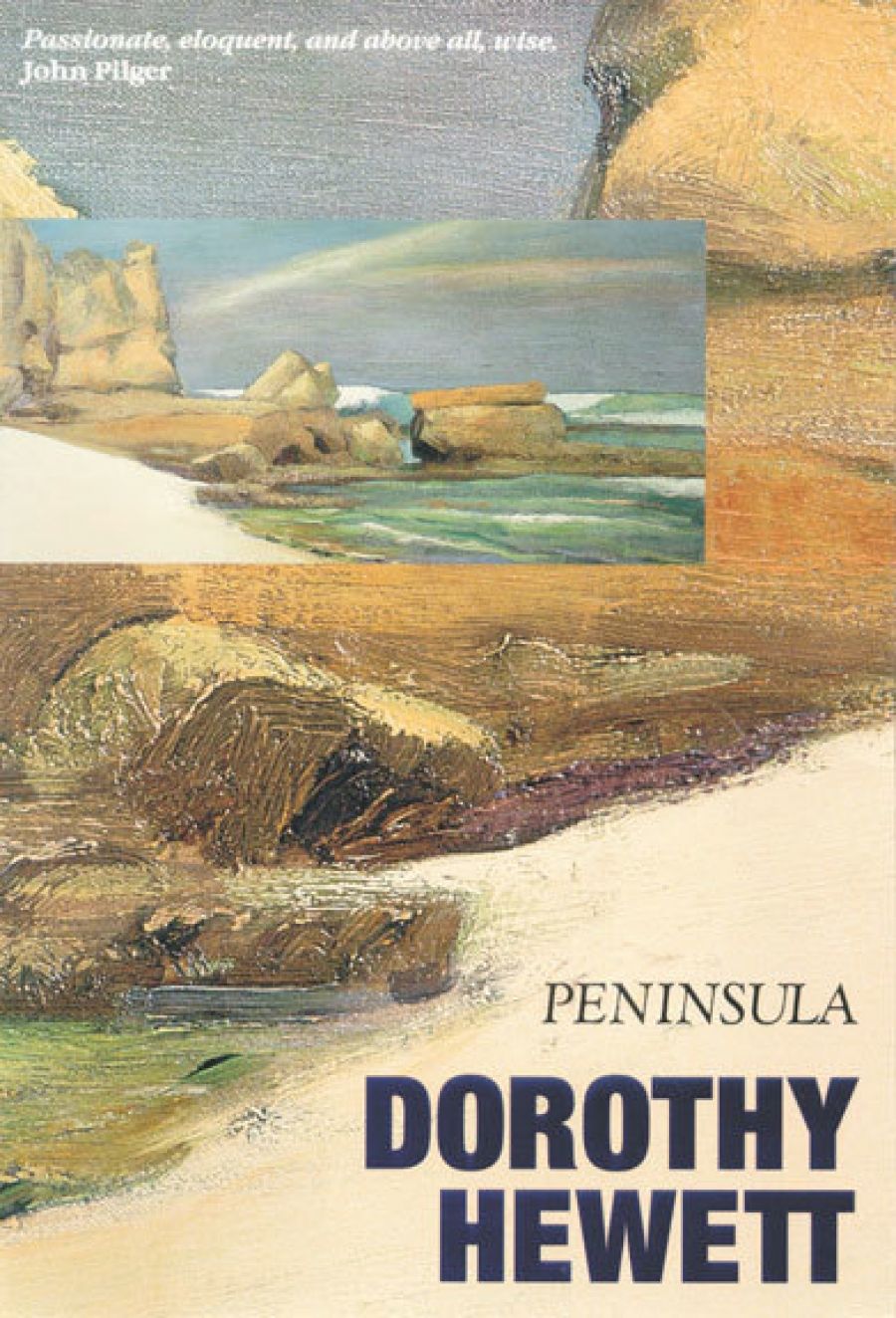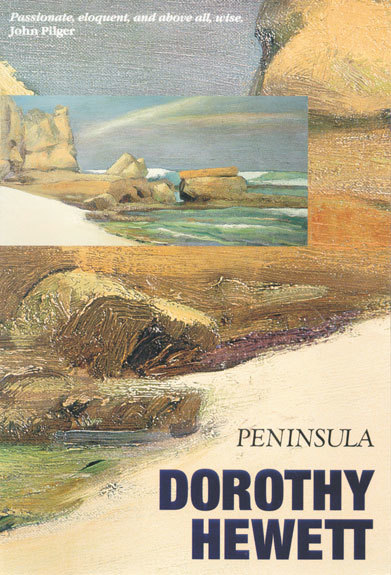
- Free Article: No
- Contents Category: Poetry
- Review Article: Yes
- Article Title: The poem as reprieve
- Online Only: No
- Custom Highlight Text:
The image of the woman imprisoned in a tower is recurrent in Dorothy Hewett’s work. In the early poem, ‘Grave Fairytale’, Hewett refashions the figure of Rapunzel to signify the woman poet whose writing depends on isolation and the suppression of her sexuality.
- Book 1 Title: Peninsula
- Book 1 Biblio: Fremantle Arts Centre Press, $16.95
- Book 1 Cover (800 x 1200):

‘Lady’s Choice’, the poem which follows, undercuts this dream. The speaker is cast as a Lady of Shallot who gets on with her writing and her weaving. Her empowerment is in choosing the way she will die: not ‘death in the town around the river’s bend / but here cold-hearted alone in my room’.
Cold comfort for the woman artist. Hewett reworks aspects of the romantic tradition but its terms define her vision: the voices of poets past and present reverberate through these poems. In Peninsula there is the desire for reparation represented as an integration of sexual and intellectual selves; but there is also a recognition that in life such wholeness is impossible.
Peninsula is divided into eight sections. First, fourth and last are the ‘Peninsula’ poems, long sequences which meditate on mortality. These frame the vigorous, compassionate explorations of myths of travel, childhood, family and love which form the groups of poems in between. The distinction between sections is not absolute: the peninsula is inhabited by revenants which the intervening poems call up. Return is a structuring motif.
Hewett represents herself as the ‘still-life ageing woman’, who speaks the poems. The house on the peninsula to which she returns, ‘with its dark rooms of the unconscious’ waiting as ‘the thorns grow higher / as the birds grow quiet’, is another version of Rapunzel’s tower of denial and desire.
Autumn becomes winter in the opening sequence, ‘On the Peninsula’.
I have come
after long struggle
to this sunlit garden
this acre of grass
this temporary haven
But even in this ‘gentle kingdom’ she dreams ‘the same old passionate / disastrous things’. In Peninsula, the garden – site of innocence and desire in Hewett’s work – mirrors the speaker’s state of being. This is a return to the garden of Alice in Wormland which turned ‘the heart towards death’.
For the speaker / poet, the she-oak seems to be totemic. It is ‘solid and black and formal’, it weeps and sighs. The she-oak ‘lifts her ponderous shadow / from the lawn’ and sings, it ‘turns grey with endurance’ and ‘shakes out its golden benison’. Like poetry, the she-oak will stay on when the poet is gone.
The Mattara Prize-winning sequence, ‘The Upside-down Sonnets’ mourns lost love: ‘I raved so many nights / in blood Save me!’ The knowledge which informs the poems in this volume is that the only one who can save the writer-heroine is herself.
‘Is love a compass / life an allegory?’ queries the speaker in ‘The Last Peninsula’. How we have arrived and what our journey means are the concerns which shape the poetry.
The woman leaves the tower but only to face her death. The peninsula is a transition zone: ‘I have taken the first step / out onto the peninsula / I hear the voices of the birds / calling each to each.’
These are poems that ache for what has been lost. The speaker is ‘burdened with memory’, she is ‘condemned to love’. In ‘Winter in Sydney’, a poem addressed to an unidentified and absent ‘you’, the speaker is ‘...reconciled / to dying / life paid me out eventually / for having the courage to love’.
Post-hysterectomy, the speaker of ‘The Last Peninsula’ says ‘the body heals around the wound / the mutilation stays’. Hewett seems to understand the process of writing as reparation in a similar way.
Poetry is compensation for loss and a talisman against death: ‘the poem is the reprieve / the chime the charm the pardon / suspending time’. But the speaker knows that this is a sleight of hand.
These are brave poems. They do not relapse into nostalgia; they recount the painful facts of a number of lives. Most have short lines and are unpunctuated but for final full-stops which pin them to the page. They know that there are:
no answers
only questions but the child
lives on in the ageing body
unreconciled
in a garden closed
on a lost and fabled world.
The themes of Hewett’s poetry are linked uneasily here. They are evident in Peninsula’s competing impulses: a need for containment and a desire for dissolution; a craving for the life of the mind, and a yearning for love; an acceptance of and resistance to mortality.
And above all there is the acknowledgement that it is the conflict of desires which produces poetry.
Dorothy Hewett will have it all ways: the ghosts which these poems invoke – and prefigure – will not easily be laid to rest.
locking the door
on the garden
full of butterflies
the wash of the tide
the she-oak sailing
through air
the golden hornet
flexing against the sun
on grey days under cloud
with the foghorns sounding
when the weather blows up
the seeds dance on the lawn
and the birds are silent
we do not lie in bed
reading under the lamplight
our eyes do not grow
accustomed to the dark
like the hornet the butterfly
and the bird
we cannot stay
like the dead leaves
on the ground
we are blown away(From Peninsula by Dorothy Hewett (FACP))


Comments powered by CComment